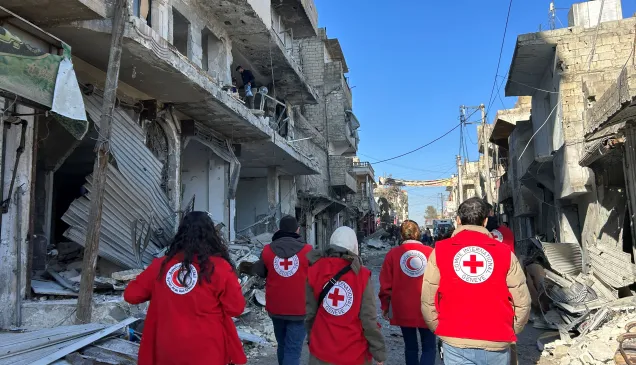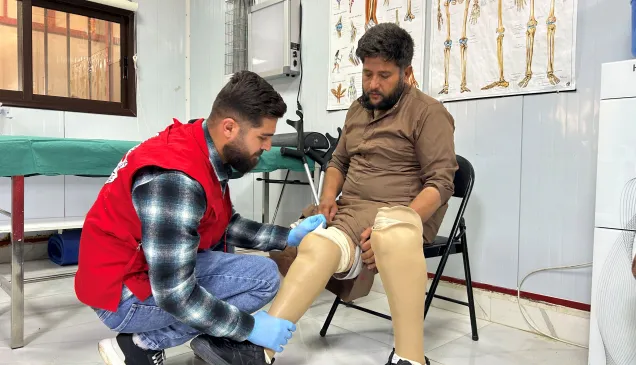Lebanon: Rebuilding a dignified livelihood
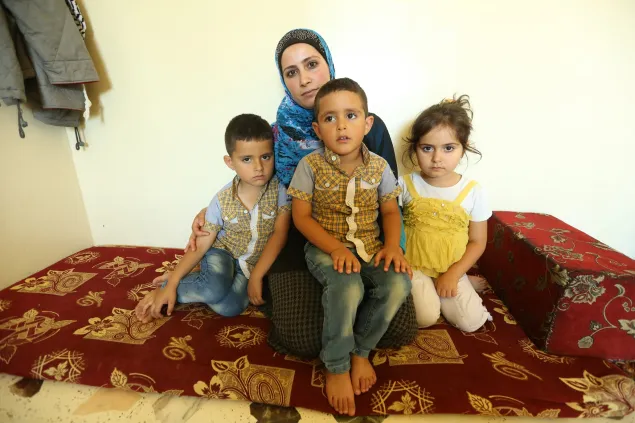
“For three years I had no answer for my children when they asked me 'What are we were going to eat today?'. I would wake up every day not knowing whether we could afford to buy food,” says Lina, a Lebanese returnee who became a mother at the age of 18, a displaced person at the age of 19 and a widow at the age of 20.
Currently living with her parents and siblings in a makeshift home in the barren lands of Ras Baalbek, Lina quickly took on a key role in her family’s newly-founded small farm. “When the livelihood programme first started, it was difficult for us to adapt. We were so used to the misery that it took a while for us to snap out of it. But then I set up a routine for the entire household, and we all fell into our roles.”
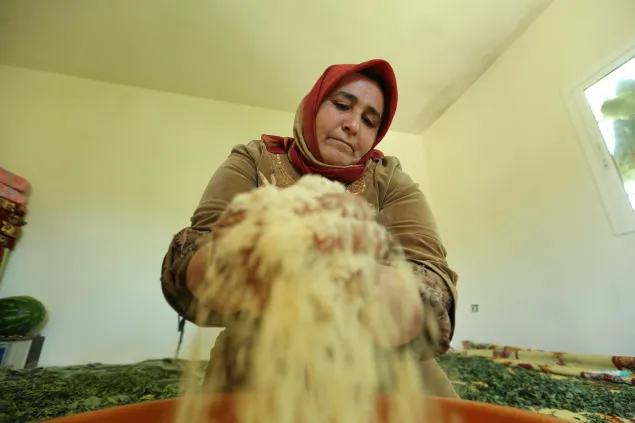
Um Mohammad in her home. Ras Baalbek, Lebanon, July 2015.
“When we fled to Lebanon, it was winter and we walked from our town in Syria to the Lebanese town of Machariee El Qaa.” Lina’s mother still shivers when she recalls their journey to Lebanon. “There was so much snow I honestly thought we’d never make it, even though it's only about 20 kilometres away. The weather was awful. But we were among the lucky ones, because we'd managed to take our papers and a few belongings with us. Many others left wearing only their pajamas.”
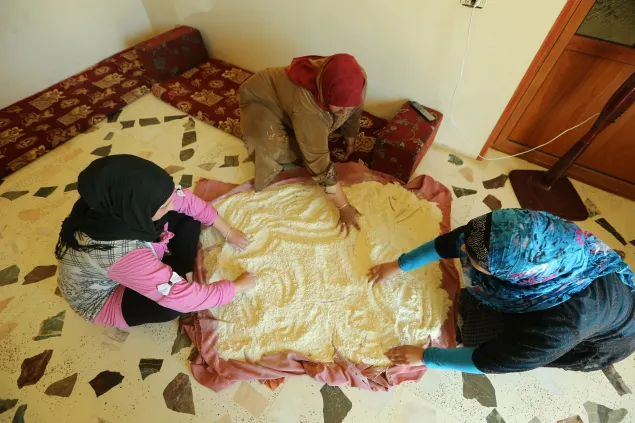
Um Mohammad prepares Kishik with her two daughters. Ras Baalbek, Lebanon, July 2015.
“When we sold our products for the first time our lives changed completely," explains Lina. "Not just financially but above all psychologically. We felt a powerful sense of relief and a peace of mind that we hadn't known for almost four years. The day after we sold our first batch of dairy products, we were buzzing around like bees. We had regained our motivation to take control of our lives,” she concludes, as she sits down with her mother and sister to prepare kishik, a traditional Lebanese porridge made from wheat fermented with goats' yogurt that they sell in the market.
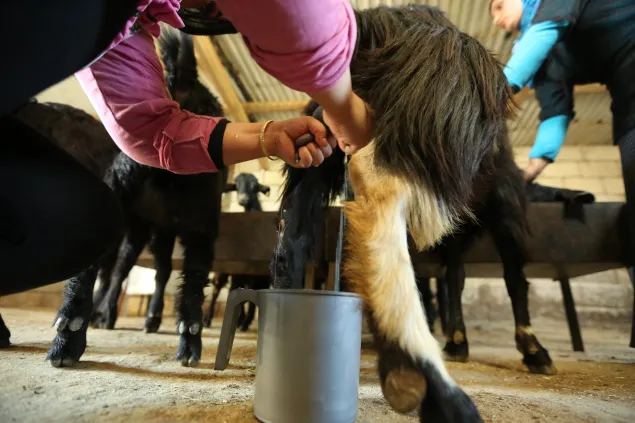
Lina and her sister milk the goats. Ras Baalbek, Lebanon, July 2015.
The goat project has become a family business. Tasks are equally distributed among the members of the family. Lina and her sister take care of selling the products at the local market, while Um Mohammad produces dairy products such as cheese, kishik and anything else that will sell.
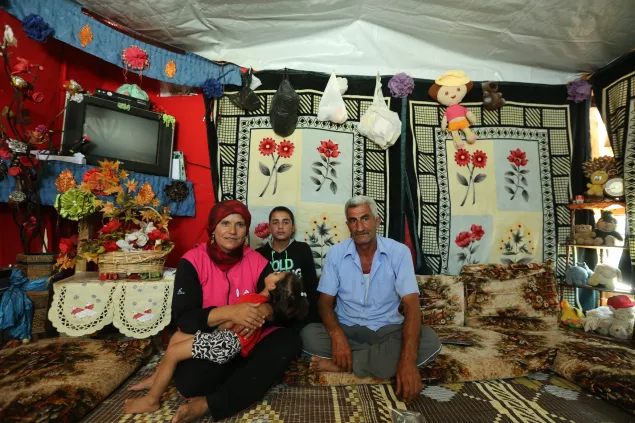
Abu Khaled sits with his family in their tent on the edge of Ras Baalbek, Lebanon, July 2015.
“For three years we suffered. We were hungry, so hungry. We couldn’t find a job that would enable us to feed our children. There was nothing to make me look forward to the next day. At some point we had to use engine oil to light a fire just to keep warm.” The pain is still visible in Abu Khaled's eyes. “We were completely dependent on the generosity of our neighbours and on the little that God gave us. I wouldn't want anyone to experience what I've been through.”
“This livelihood project has changed our lives radically. Today, I have my own home. It may only be a tent, but at least it’s mine and I can provide for my family.”
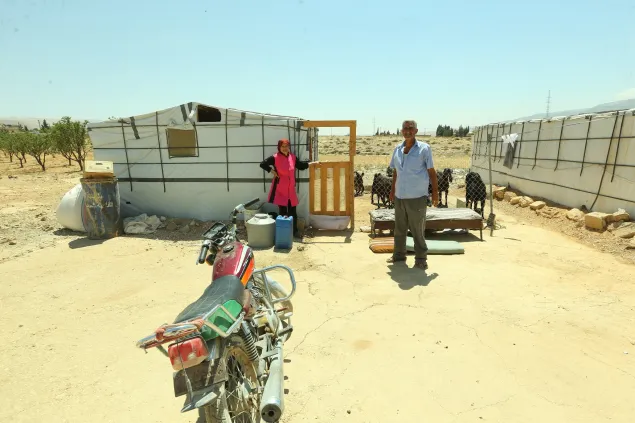
Um Khaled and Abu Khaled stand near their barn in Ras Baalbek, Lebanon, July 2015.
“Now that we have a home, our plan is to expand the farm. We want to invest in this project and make it grow. This is what’s sustaining my family right now,” says 40-year-old Um Khaled. Like Lina’s family, they’ve distributed the tasks equally among themselves. Um Khaled is in charge of looking after the goats and milking them, while Abu Khaled takes them out to graze every day.
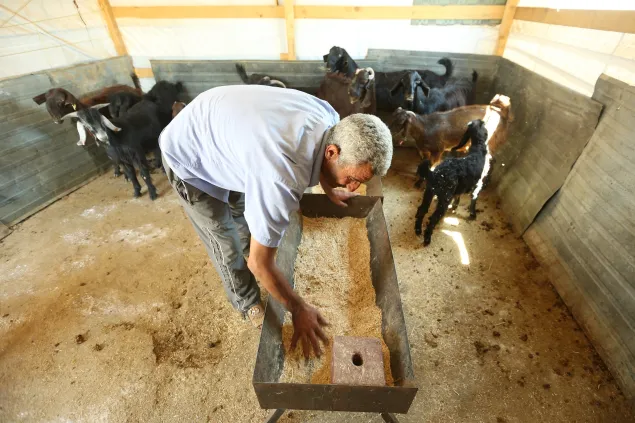
Abu Khaled checks the feed in his barn. Ras Baalbek, Lebanon, July 2015.
“What makes me extremely happy as a vet is the cleanliness of the barns. This is something we are determined to focus on and we’re amazed to see that the families take hygiene so seriously,” says Imad Sawwan, a vet from Jihad Al-Bina’a, the NGO that worked with the ICRC on this programme.
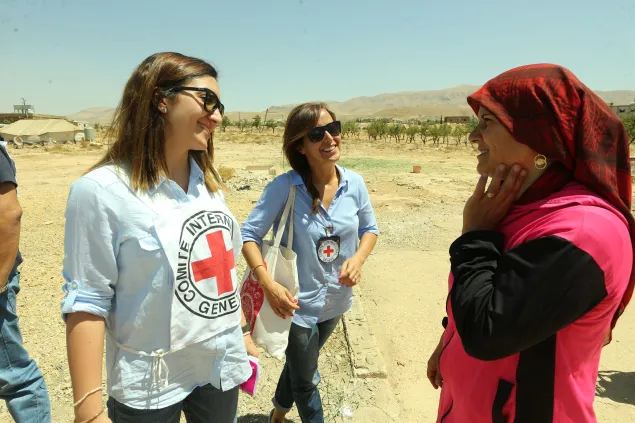
ICRC personnel chat with Um Khaled, one of the Lebanese returnees. Ras Baalbek, Lebanon, July 2015.
“If the families sell milk they’ll make a certain amount, but if they sell derivatives such as kishik and cheese, and use the droppings as manure, their profit margin will be much higher,” explains Jihad Nabhan, the ICRC specialist in charge of the project. “According to our estimates, the families could make at least $200 per month. In 24 months, we expect some families to have 31 goats and be making a minimum of $1,500 a month.”
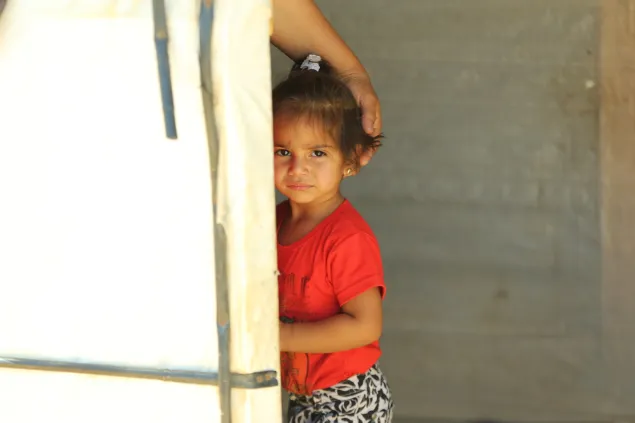
Rahaf, Um Khaled’s two-year-old granddaughter, in their tent in Ras Baalbek, Lebanon, July 2015.
“We don’t even know if our homes are still there or if they're just ruins now, but we're still planning to go back when the violence stops,” says Um Khaled. “That’s where we had built our lives, and we have great memories of a peaceful life there. We lost everything and we lived a harsh life for years here. Now we’re slowly getting back our hope and our dignity.”
They are Lebanese. Decades ago, their ancestors settled in Syria. When war broke out in 2011, they fled Syria to their country of origin, leaving behind their homes and their belongings; their entire lives. As Lebanese nationals, they are not eligible for refugee aid, yet many of them endure the same hardships and are in dire need of assistance.
At the end of 2014, the ICRC began providing Lebanese returnees with cash assistance for a period of six months. And to help about 20 particularly vulnerable returnee families to start earning a living, the ICRC has been working with local NGO Jihad Al-Bina'a, providing goats and training so that people can produce and sell goats' milk and other dairy products.
The ICRC has also coordinated with the High Relief Commission (a Lebanese government agency), the International Organization for Migration and UNHCR to aid vulnerable Lebanese returnees who are not receiving any other help.
The ICRC hopes to help them regain a little bit of economic independence, boosting their self-confidence and restoring their dignity.

